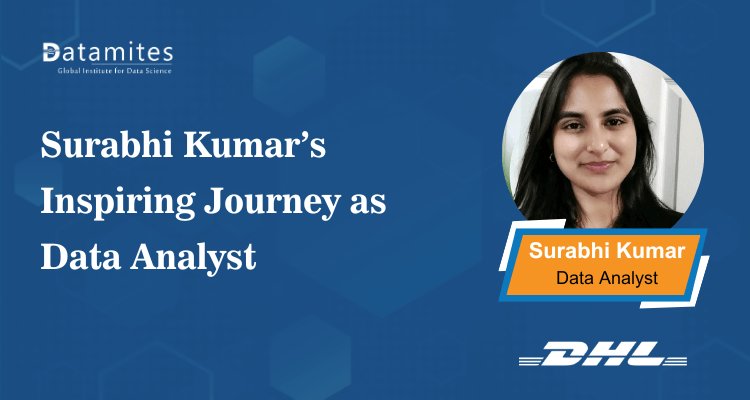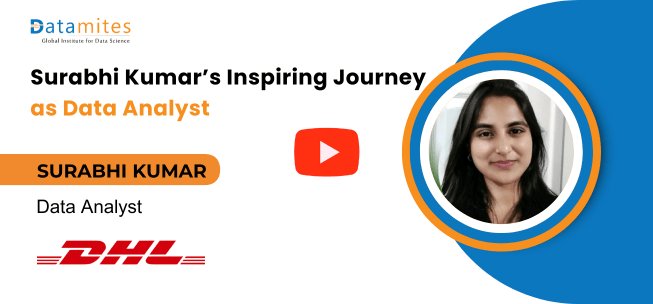From IT Graduate to Business Data Analyst: Surabhi’s Journey
Discover Surabhi Kumar’s inspiring journey from IT graduate to Business Data Analyst with DataMites. Learn how structured training, real-world projects, and certifications helped her succeed. Explore top data analyst training opportunities across major Indian cities.

In today’s data-driven world, many professionals are transforming their careers by stepping into the field of analytics. Surabhi Kumar—an IT graduate from India who pursued her passion for data and transitioned into a successful Business Data Analyst role at DHL Supply Chain. She shares her inspiring journey, the role of DataMites institute in shaping her skills, the tools and techniques she mastered, and her strategies for cracking interviews in a highly competitive job market.
Surabhi Kumar’s Inspiring Journey as Data Analyst
From IT graduate to Business Data Analyst, Surabhi Kumar’s journey is a testament to how structured training, practical experience, and determination can lead to success in the global analytics space. Discover how DataMites institute helped shape her career path.
Q1. Could you tell us about your background and how you got into data analytics?
I hold a Bachelor's in Computer Information Science and a Master's in Business Analytics. I always had a strong interest in data, which led me to enroll in the DataMites Data Science program in 2020 while I was working with DataMites training institute.
Q2. Why did you choose DataMites for your training?
DataMites offered a comprehensive and structured curriculum that helped me go from foundational concepts to advanced analytics. The hands-on learning through real-world projects and the guidance from experienced mentors were instrumental in my career growth.
Q3. What topics and tools did you learn during the DataMites course?
We covered statistical analysis (using SAS), machine learning algorithms, Python, SQL, Power BI, Tableau, Agile methodology, ETL processes, and data engineering concepts. I also worked with libraries like NumPy, Pandas, and Matplotlib.
Q4. How did the hands-on projects help you?
The real-world projects made the biggest difference. They reinforced the theoretical knowledge, helped me gain practical experience, and gave me the confidence to solve data-related challenges in real job settings.
Q5. What was your study pattern like?
Initially, I was overwhelmed, but the structured guidance helped me prioritize topics. Python and SQL were challenging at first, but I practiced regularly. I created a daily learning schedule and supplemented it with external resources like Kaggle and GitHub.
Q6. How did you prepare for job interviews?
I prepared by researching companies, reviewing my own project work, giving mock interviews, and brushing up on both technical and behavioral questions. I also worked on my confidence and communication skills, which are essential in interviews.
Q7. How many interviews did you attend, and what helped you crack them?
I gave a few key interviews, including one at a startup and another at a reputed company. What helped was my preparation, confidence, and ability to demonstrate real project experience and technical skills relevant to the role.
Q8. What are the most important skills for a Business Data Analyst?
SQL and Python are must-haves. Additionally, familiarity with big data technologies like Hadoop and Spark, machine learning basics, and data visualization tools like Power BI and Tableau are crucial. I also got certified in Power BI and Alteryx, which added value.
Read the articles:
- Naveen Kumar's Inspiring Career Transition to Data Analyst
- Sethupathi’s transition to Senior Data Analyst
- Jithin’s Transition: From Engineering to Data Analyst
Q9. Did your certifications make a difference in the job hunt?
Absolutely. In one of my recent interviews, my Microsoft PL-300 Power BI certification helped me stand out. Certifications showcase your commitment to continuous learning and add credibility to your resume.
Q10. What were the major challenges during your journey?
Choosing the right tools for projects and figuring out how to implement them was tough. But my curiosity kept me going—I enjoyed solving problems and seeing the results of my work.
Q11. How important is SQL and Excel in your current role?
SQL is used daily—it’s the backbone of data analysis. Excel is also extremely useful, especially for organizing data, creating pivot tables, and preparing reports. It’s also a great support tool for Power BI.
Q12. How do you stay updated with new tools in data analytics?
LinkedIn, online communities, and tech blogs help a lot. I also follow companies’ innovation pages to stay informed about trending tools. It’s important to keep learning continuously to stay relevant.
Q13. Any final advice to aspiring data analysts?
Master the basics first—statistics, programming, and data handling. Work on real projects, build a strong portfolio, and keep improving. Networking, certifications, and staying updated with industry trends are also key to long-term success.
Key Takeaways from Surabhi’s Journey:
Surabhi’s inspiring journey into data analytics highlights the power of structured learning, practical skills, and continuous growth in building a successful career in this dynamic field.
- Structured Learning Makes a Difference: Enrolling in a well-structured top IT course like the one offered by DataMites helps bridge the gap between theoretical knowledge and practical industry applications in data analytics.
- Master the Essentials: Proficiency in Python and SQL is fundamental for aspiring data analysts. Earning certifications in tools like Power BI and other business intelligence platforms enhances your profile and marketability.
- Hands-On Experience is Crucial: Engaging in real-world projects and case studies builds both technical confidence and job readiness, helping candidates tackle actual business problems effectively.
- Interview Preparation is Multi-Faceted: Success in job interviews requires a mix of technical preparation, behavioral training, and above all, self-confidence.
- Stay Ahead with Continuous Learning: In the rapidly evolving field of data analytics, staying updated with the latest trends, actively networking, and embracing continuous learning are key to long-term career success.
Surabhi Kumar proves that with the right guidance, consistent effort, and curiosity, anyone can transition into a rewarding career in data analytics—even in a global market. Moreover, India’s data analytics market is witnessing rapid expansion, valued at USD 2.6 billion in 2024 and expected to soar to USD 27.0 billion by 2033, growing at a strong CAGR of 27.46%, according to the IMARC Group.
Also refer to the articles:
- How to Become a Data Analyst in Mumbai
- The Future of Data Analytics in Mumbai: Trends and Opportunities
- How much will be the Data Analytics Course Fees in Mumbai
Enrolling in an offline Data Analyst course in Pune or other major tech cities such as Bangalore, Chennai, Coimbatore, Hyderabad, Ahmedabad, Delhi, Chandigarh, Jaipur, and Mumbai offers a gateway to real-world industry exposure, meaningful networking opportunities, and robust career prospects in data analysis and software development.
DataMites Institute stands out as a premier training provider in fields like Data Science, Artificial Intelligence, Machine Learning, Python Programming, Data Analytics course with internship, Data Engineering, and IoT. With hands-on learning through live projects and internships, we ensure practical expertise and strong placement support. Join our alumni network and transform your career with DataMites!
What sets DataMites apart is its unwavering commitment to quality and global recognition. The institute offers internationally accredited certifications from esteemed organizations such as IABAC and NASSCOM FutureSkills, which validate a candidate’s expertise in Top IT Courses and significantly boost their employability in a competitive market.
Alongside the offline centre for Data Analyst training in Pune, DataMites offers flexible learning options in other major Indian cities including Bangalore, Hyderabad, Coimbatore, Ahmedabad, Chandigarh, Chennai, Delhi, Jaipur, and Mumbai—ensuring learners across India can access industry-ready training close to home.

